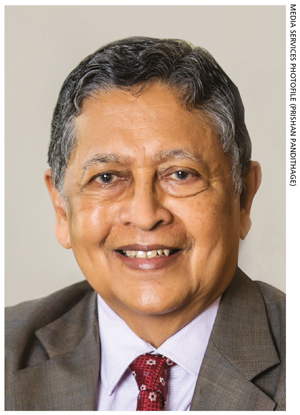THE PRIVATE SECTOR
Compiled by Savithri Rodrigo
BEYOND THE COMFORT ZONE
Mahendra Amarasuriya emphasises the private sector’s role in nation building
Q: How would you assess the economic fallout post 4/21?
A: An already debilitated economy was seriously affected by the attacks, which don’t seem to have been anticipated by the security authorities. The fallout has been exacerbated by mob violence targeting Muslims.
Uncertainty and confusion therefore, are impacting daily life and eroding business confidence.
Q: In your view, which industry has been impacted the most?
A: From an economic perspective, it would have to be tourism – a mainstay of the economy.
With a number of tourist deaths and injuries, the terrorist attacks are considered one of the worst in recent times – and they led to negative publicity for Sri Lanka. Travel advisories were issued immediately after the bombings, arrivals have dwindled and the overall impact has been devastating.
Q: How do we set about regaining the tourism dynamism?
A: Globally, the tourism industry has recovered if one were to consider Bali and Egypt as examples.
However, this takes time and depends on the ability of the government to build confidence about the safety of the destination. This will be quite challenging to achieve in the short term especially given the mob violence that followed the 21 April attacks and led to added concerns.
It’s the responsibility of the government and security forces to ensure the restoration of normalcy. Whereas the state ought to drive such efforts, there doesn’t seem to be strong leadership to ensure that the situation is under control.
Religious leaders, NGOs and the private sector must assist the government, to maintain peace and harmony – while the first two are active in this sphere, the private sector doesn’t appear to be proactively involved.
Q: As for the national economy, what are the negativities?
A: Hardly any growth was observed previously and GDP was estimated to rise by four percent this year. But now, even this is unlikely and there’s a likelihood of recording the lowest GDP in recent times.
The government is not driving the economy in a specific direction and its strategies seem like ad hoc interventions. Revelations have been made by the Committee on Public Enterprises (COPE) that the budget data is incorrect with income being overstated and expenditure understated. It’s been noted that many budget proposals cannot be practically implemented.
And whether supplementary estimates approved for the purchase of bulletproof vehicles and laptops for schools are for genuine purposes or personal gain is questionable. And 3,800 sports instructors have been appointed, most of whom are seemingly unqualified and merely party supporters – this increases government expenditure even further.
Q: Is there cohesion between the state and private sectors in the current environment?
A: The tourism industry has negotiated a package with a moratorium on capital and interest on outstanding loans, and a reduction of the Nation Building Tax (NBT) and other taxes. It is essential that hotel rates are discounted, and also airport charges and related taxes. Costs normally incurred by tourists must come down.
The private sector, which represents all sectors of the economy, has held negotiations with the treasury and related authorities to limit the adverse impact on industry.
Q: How can the economy’s strengths be optimised in this situation?
A: Lonely Planet named Sri Lanka as the best tourist destination in the world for 2019. Going by this and other accolades Sri Lanka gained in the past, tourism is perhaps the only potential growth industry.
Therefore, every effort should be made to promote tourism even in times of adversity. This can be achieved only if the government brings the security situation under control and instils confidence in the context of visitor safety.
IT is another area where recent events would not have a potentially serious impact and this must be exploited to the maximum.
Q: Where do you see the economy in the near to medium term?
A: In a realistic sense, the economy is likely to experience a further downturn. A revival of the tourism industry is essential for the economy to grow in the medium term. Gaining control of the security situation is also of paramount importance as tourists will not travel even to the most exotic destination if their lives are in danger.
The trade war between the US and China will have an adverse impact globally and could indirectly affect Sri Lanka. Further US sanctions on Iran and the confrontation between the two countries, in addition to sanctions on Venezuela by the former, will result in higher oil prices.





